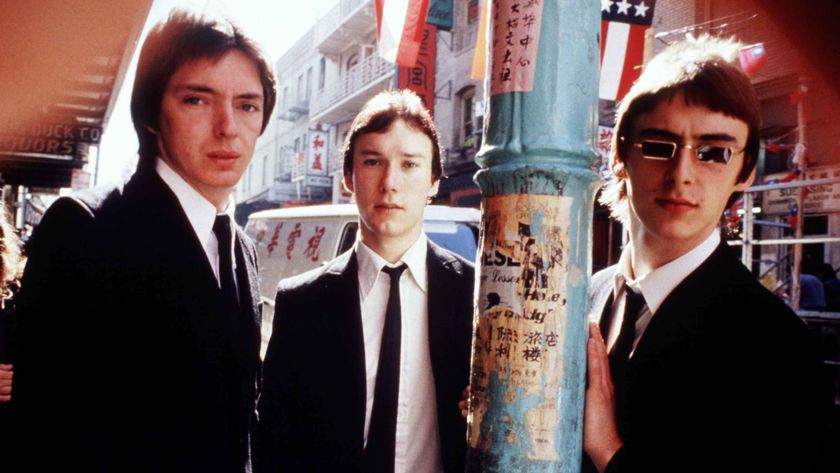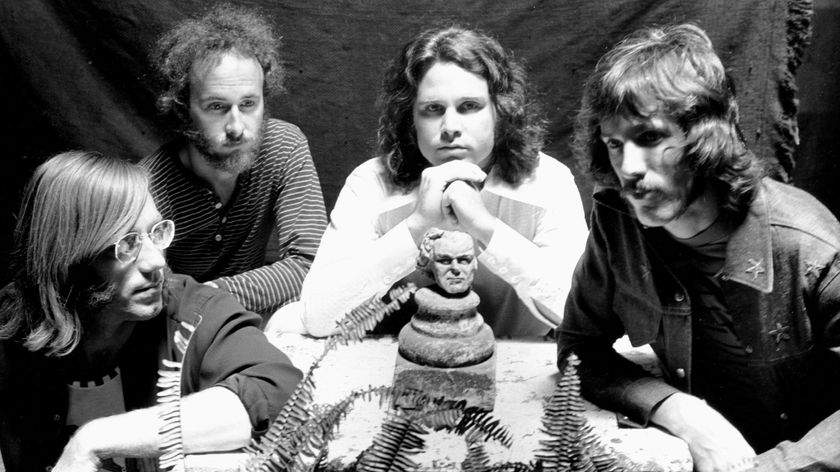Mikkey Dee talks Motörhead, life after Lemmy and joining The Scorpions
'Lemmy's sitting up there laughing...'
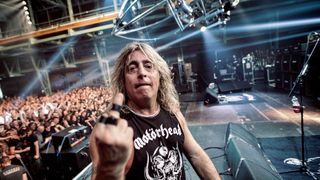
Raising hell with Motörhead and The Scorpions
When we speak, it is six months since the death of Lemmy Kilmister, a man for whom the word legendary seems like an understatement, when we met with Mikkey Dee.
Dee is in London to join Saxon for a tribute to his old bandmate. Along with Motörhead guitarist Phil Campbell, they blast through Ace Of Spades, Overkill and Born To Raise Hell, with Dee borrowing Saxon drummer Nigel Glockler’s kit.
“Nigel’s drums are very hard to play,” says Dee after the sound-check. “He has his set-up completely opposite from what I have. I sit very low and I have to lower his seat, but I can barely reach his cymbals, so I’m probably breaking a lot of sticks today.”
Few drummers in rock can compete with the power that Dee brings to the kit. Born and raised in Gothenburg, Sweden, he originally wanted to be an athlete. “I did a lot of ice hockey and sports. Music was always a hobby for me, I thought, ‘I’ll be a hockey player.’ But I kept playing,” he says.
Dee attributes his unmistakably physical approach to his craft to his childhood athleticism.
“I skied, did karate, football, hockey, some tennis, gymnastics, I’ve done sports my whole life,” he says, “and when I say doing sports, a lot of people do sports, I was really in there competing and trying to make it as an athlete in a lot of ways. That gave me, I guess, a basic stamina. When you’re on the ice playing hockey, the rink is spinning sometimes you’re so tired. You have a pulse of 300 and you just can’t leave the ice. You have to stay out there. That helps me in drumming.”
Watching Dee play with Motörhead was always a study in raw power and seemingly inexhaustible energy. He didn’t play the drums, he hammered at them and loved every minute of it. “I’m very proud of being such a big part of Motörhead, not just jumping into the band and surviving and playing drums, but taking over from Philthy Animal Taylor.” he says.
I’m very proud of being such a big part of Motörhead, not just jumping into the band and surviving and playing drums, but taking over from Philthy Animal Taylor.
“I came in and changed the band and I said I was going to do that. Lemmy gave me all the room I wanted, and Phil of course. They just loved the new energy. We wrote different types of songs. I’d say we went more into rock and metal than the way Motörhead was before. They were maybe a little more punk-ish in the earlier days, more inspired by ’50s rock meets ’70s punk. I loved it, there was nothing wrong with that, it was just maybe not so much me.
“I was bringing in vibes from Purple, Thin Lizzy. Lemmy was such a great musician and bass player. Of course he was not a Mark King from Level 42 on his bass, but the way he played, no one else could play, that was so unique. And his way of thinking music and performing music, let’s not even go there because there he is completely alone. There is nothing close to what he was.”
Listen and learn
However, when Dee joined Motörhead, the rest of the band didn’t look to the drummer to set the tempos. “The problem I had with the band when I joined was that they never listened to the drummer. It took three, four, maybe five years before they really trusted me, to listen to me,” says Dee, who found that his bandmates could be playing half a beat ahead of or behind him.
“I said, ‘You have to listen to me, I’m setting the tempos and I’m staying on the beat.’ Without bragging, my meter is pretty good. These guys were going all over the place because they never listened to the drummer. Taylor was a great drummer in his style and he fit Motörhead perfectly when he was in the band but he listened to Lemmy and followed these guys. He didn’t put his foot down and stand his ground, so it took me several world tours before they leaned on me and trusted me and as soon as we did that, we sounded so much better.”
Once the rest of the band started listening to Dee, there was still room for them to push or pull against the beat when it fit the music. “Sometimes it was great when Lemmy pushed away and I had to stay there, but most of the time I think I was a little bit on top, they played a little bit behind me which makes me sound like I’m driving the band and I’m doing the exact same thing with the Scorpions.”
One major difference between the two bands is the Scorpions use in-ear monitors on stage and play to a click track. “I’m playing way more on top of the click without taking off to drive the band because if I’m behind it sounds like I’m dragging,” says Dee. “The drummer cannot be behind. Parts of songs where it fits, yes, a lazy snare, a little bit behind the click, it works in sections of songs, but in general 85-90 percent of the set in that type of music, I’ve got to be on top. We’re talking rock and metal. Tommy Lee, I know him well, he’s not the best drummer in having a million chops, but he’s got a regular beat that drives like a motherf**ker and that is very, very important.”
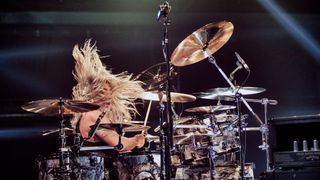
Out in the dark
Dee says the click is there to make sure the music matches up with everything the band has happening on the LED screens that are part of the Scorpions’ show.
“And they like to play to it. I tend to agree. It sounds really good,” he says. “A lot of people go, ‘Oh, you’re so stuck with that click.’ No, you’re really not. If you’re used to it, you play around it and play the way you want anyway. It’s just nice to have a little reference and on certain sections I actually have some help because they have some long, long songs.
“For instance, this song The Zoo, an old classic, it’s so slow! It’s the hardest song in the set and it keeps going and for a drummer it’s so easy to wander away, to lose focus on where you started. With Motörhead we had some of these mid-tempo songs, they’re the hardest songs to play. You have no reference, you’re out there in the dark, there is no solid ground anywhere.
[The Scoprions] have rock’n’roll in a German way, and Motörhead was rock’n’roll in a British way and it’s just super-fun.
“Like Orgasmatron for instance, you lose track of where you are in the song, because it’s the same beat and you could easily slow down. It’s so heavy that you want it even more heavy, so you start playing it heavier midway through the song, which didn’t make it heavy – it made it drag. If you played it too sharp, you’d start taking off instead, then you were speeding it up. I heard on a lot of recordings that I had trouble sometimes on that song because you lost where you were.
“So these songs, it’s great to have a click track as a reference. I don’t think that’s bad at all, with the Scorpions it works really good and I’m glad. Jumping into the band, we had one and a half days’ rehearsal in Germany and then I’m out for 52,000 people in Charlotte, North Carolina. And of course it will take a few shows before I have the songs comfortably enough to know where all the tempos are so I was very thankful for having that click in the beginning!”
Blackout point
Formed in 1965, the Scorpions have been rocking even longer than Motörhead. “They’ve done it all,” says Dee. “It’s great fun for me to play something different. They have so much rock’n’roll in them.
They have rock’n’roll in a German way, and Motörhead was rock’n’roll in a British way and it’s just super-fun. They’re the nicest guys. It’s a great challenge for me because it’s not easy to play their stuff, it’s way harder than I ever expected because of their arrangements. I’m getting into it now.” After completing the US and Mexico legs of the world tour, Dee says he is starting to feel confident again although it’s been quite a challenge playing an entirely new set of material after 25 years with Lemmy and Phil Campbell.
I love being so tired that I’ve got to get my last 30 percent to kick in. I really feel after the show that I’ve given everything.
“It’s very hard to suddenly start re-thinking your way of playing and the way of life I had working with Motörhead,” he says. “That’s not easy to just swap over a weekend. Now after these shows, it’s coming together so good and I think they love getting some real power back there because I like to deliver that. I like to continue playing with power and the stamina.
“I get tired but I play better when I’m tired. The set is great because it goes up and down. It’s got this acoustic medley which brings it down, we play Wind Of Change after that, I’m almost freezing onstage, and then we go into Rock’n’Roll Band, Dynamite, the drum solo, and then straight into Blackout. There’s not even one word between songs, it’s just bam, bam, bam, bam.
“I see stars in Blackout, I’m so tired, I love it. And I’m four metres up – the riser goes up and I’m already on the biggest walkway you’ve ever seen in your life and I’m scared of heights! Blackout starts up there and the riser is going down and I’m almost fainting, falling off that stool and I love that. I love being so tired that I’ve got to get my last 30 percent to kick in. I really feel after the show that I’ve given everything. We finish off with Rock You Like A Hurricane, it’s such an explosion of energy. So it’s really cool for me, I love it.”
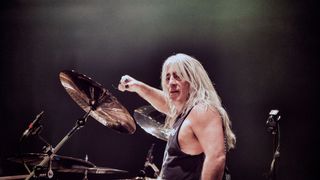
End of the road
Given the length of time he spent with Motörhead, which was substantially longer than any of his predecessors and included 12 studio albums, Dee shows no signs of hanging up his drum sticks in the wake of Lemmy’s death.
I always remember Lemmy saying, ‘If we can’t sound like Motörhead, what’s the point?’ We got asked to do unplugged things and shows where we’d have to turn down – what’s the point?
Listening to the posthumously released live recording Clean Your Clock, the band still sounded great. “No one thought that would be Lemmy’s last tour, but I felt it,” says Dee. “I always remember Lemmy saying, ‘If we can’t sound like Motörhead, what’s the point?’ We got asked to do unplugged things and shows where we’d have to turn down – what’s the point? If we can’t be Motörhead, why are we going to be out there pretending? We always said, when it doesn’t sound like it should, we’ll step down. In the end, Lemmy struggled so hard. He put in 300 percent just to be able to do a show.”
Dee says he thought the band would have to become more selective about touring as Lemmy had been dealing with poor health for several years. “I felt that this would probably be amongst the last stuff we’d do live, at least for a while. Or at least we’d have to re-think, maybe just doing hand-picked summer festivals in Europe, then rest, then maybe do a small US tour and nothing else.
"And next year maybe a few festivals to scale it down and still be able to play. Lemmy wouldn’t sit still, he wanted to go, go, go, so it was up to us to slow him down a little bit. That last German tour, I felt he needed to go back and add some weight to his little, skinny body and then we could come back but I did not think that he would pass away. He went out with a bang.
"I still can’t believe, when we did these shows that we did on the European leg, how much energy we put out and that Lemmy was even able to do these shows. I came up to his hotel room talking to him before we’d check out or we’d be sitting in the bus talking, ‘Are you comfortable with the set? Do you think we should move any songs around?’ And he was just so exhausted. I’d go, oh my god, four hours and then we’ve got to play. And we’d go on stage and he exploded. Like, no problem, then after the show he’d basically collapse.
[Lemmy]took charge of his last moments himself. Very typical. A real stubborn bastard. He’s sitting up there laughing – or down there, I don’t know where he is.
"The next day, I’m looking at him on the bus, I don’t know if we’re going to do a show tonight, then we walk on stage and he just did it and did it better than he’d played in three or four years since he got sick. So this was really almost meant to be.
“Before people die they seem to get extra energy or something to get your affairs in order. I don’t know what that’s all about but he played his ass off and did it so well. I felt for him because I saw how much he had to give to be able to perform so I figured we’ll have a break here, we’ve got to let Lemmy gain some weight and get some energy back and then I think it’s going to be fine, but unfortunately he called it a day. ‘I had a good run,’ that’s what he said. ‘I had a good run.’ He wasn’t going to do chemo and all this bulls**t, he said. ‘I’m going to sleep,’ and then he died.
“He took charge of his last moments himself. Very typical. A real stubborn bastard. He’s sitting up there laughing – or down there, I don’t know where he is. I said every snare hit I play from now on until I go into the grave will be a small tribute to Lemmy and be in honour of the man who taught me so much and stood up for me. This is the exact arena I played my first time in Europe with Motörhead and if eyes could kill I would have been murdered right away.
“A lot of people didn’t know me and they literally stood pointing at me going, ‘How can you bring this w**ker into the band?’ I was the wrong guy completely. They hated me. But Lemmy stood up for me. He said, ‘Get out of my dressing room. Mikkey’s unbelievable, you wait and see!’ After the show the same guys wanted to shake my hand, ‘This was the best Motörhead show we’ve ever seen,’ and I got accepted. Just to be able to hang out with a man like that, that is my little tribute to him.”
Most Popular







